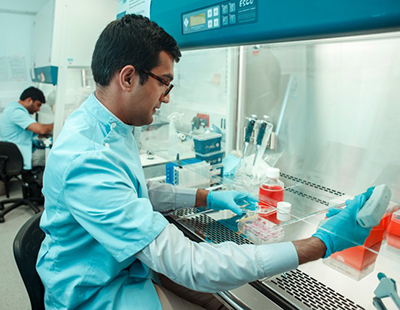MND study provides exciting new focus for potential drug treatments

Motor neurone disease treatments that boost energy in nerve cells could be developed thanks to new research.
A Euan MacDonald Centre laboratory study has shed light on how the damage to nerve cells caused by MND can be repaired by improving the energy levels in mitochondria – the power supply to the motor neurons.
Researchers have discovered that, in human stem cell models of MND, the axon, the long part of the motor neuron cell that connects to the muscle, is shorter than in healthy cells. Also the movement of the mitochondria, which travel up and down the axons, is impaired.
The scientists showed that this was caused by a defective energy supply from the mitochondria and that by boosting the mitochondria, the axon reverted back to normal.
The study was led by Dr Arpan Mehta (pictured) alongside Dr Bhuvaneish Selvaraj and Professor Siddharthan Chandran, all from the Euan MacDonald Centre for MND Research on Edinburgh BioQuarter.
The researchers used stem cells taken from people with the C9orf72 gene mutation that causes both MND and frontotemporal dementia. They used these stem cells to generate motor neuron cells in the lab to use in their experiments.
The study also examined human post-mortem spinal cord tissue from people with MND who had kindly donated their tissue through the Medical Research Council Edinburgh Brain and Tissue Bank. The results supported the findings from the stem cells.
Although the research focused on the people with the commonest genetic cause of the ALS (amyotrophic lateral sclerosis) type of MND, researchers are hopeful that the results will also apply to other forms of the disease.
The results of the study are now being used to look for existing drugs that boost mitochondrial function and may be able to be repurposed to treat MND.
Dr Arpan Mehta, Lady Edith Wolfson Fellow and PhD student at the University of Edinburgh, said: “ The importance of the axon in motor nerve cells cannot be understated. Our data provides hope that by restoring the cell’s energy source we can protect the axons and their connection to muscle from degeneration. Work is already underway to identify existing licensed drugs that can boost the mitochondria and repair the motor neurons. This will then pave the way to test them in clinical trials.”
The study was funded by the Medical Research Council, Motor Neurone Disease Association, Euan MacDonald Centre for MND Research, My Name’5 Doddie Foundation, UK Dementia Research Institute and Anne Rowling Regenerative Neurology Clinic.



